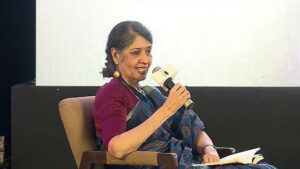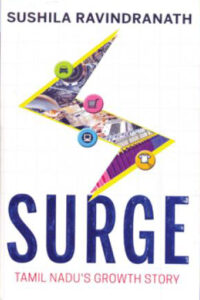Registered with the Registrar of Newspapers for India under R.N.I 53640/91
Vol. XXXI No. 1, April 16-30, 2021
The Surging Southern Industry

When I moved to Madras to start writing about Southern business houses for Business India, Uncle Muthu was delighted. He said it was a gap which needed to be filled. He was a fount of knowledge. He was a people person and knew everybody and had an insight into what was going on.
I owe my very first cover story to Uncle Muthu. He was then working for the TTK Group and told me they had to be written about. They were so low key that the rest of India had not heard about them. I gave the title, The Dark Horse From the South and it was a revelation to many what an interesting business house it was.
He read every story I wrote. He praised and criticized. He shared gossip with me. He was such a support.
After a few years he started telling me to write a book. Every time we met, he would ask me when are you writing that book. When I finally started writing Surge, I would turn to him for help. He, the veteran of many books, was full of suggestions and showed me the direction many times.
Uncle Muthu was the most generous and giving person I have known.
– Sushila Ravindranath

The Murugappa group was founded in 1900, when Dewan Bahadur AM Murugappa Chettiar established a money-lending and banking business in Burma (now Myanmar), which then spread to Malaysia, Sri Lanka, Indonesia and Vietnam. Murugappa family acquired 20,000 acres of land in Burma over a period of time and the founder (1884-1949) became a wealthy and prominent citizen of the country, was appointed to the Viceroy’s council and accorded the title of Dewan Bahadur. But when Burma became Independent in 1947, the Burmese government peremptorily nationalised all foreign land holdings “without paying a cent as compensation”.
“The factor that prevented the nationalisation calamity from turning into a disaster for us was our financial accounting system, under which all collections made by the branches were required to be remitted to our head office at Madras. Thus when the Burmese nationalisation blow fell, we had sufficient liquid resources in India to provide us with a base to rebuild,” said AMM Arunachalam, son of the founder.
Fortuitously the Murugappa family had established a manufacturing enterprise – Ajax Products Ltd. – a company that specialized in the manufacture of steel security equipment and sandpaper in 1939. But nevertheless the manufacturing base of the company was too narrow and early in 1949 the family held a council of war in Madras.
At that meeting a rather painful decision was taken to give up banking and go in for manufacturing in a big way. After looking around and doing some elementary market research, the founder, Murugappa Chettiar felt that the bicycle had a future in India and after very quick and amicable negotiations with Tube Investments Ltd., UK – then the world’s largest manufacturers of bicycles – the TI Cycles of India factory was established in 1949 itself at Ambattur, near Madras. This was the beginning and the TI Group later renamed Murugappa Group grew into one of India’s largest family run enterprises.
When the International Institute of Management (IMD, Lausanne), a prestigious business school and non-profit foundation presented its Distinguished Family Business Award 2001 to the Murugappa Group in Rome, it became not only the first Indian company to win this recognition but also the first Asian one. No one else from India has got it ever since.
The award given by the Swiss Foundation is based on several criteria. The family should have run the business for at least three generations; it should be a national leader in business as well as have international business; it should have strong links with tradition, yet move with the times and be innovative. It should demonstrate good corporate governance. It should be a good corporate citizen. The family fulfills all these criteria and more.
Looking Back from ‘Moulmein’, the biography of A.M.M. Arunachalam (the head of the family from 1965), by S. Muthiah, explains how the family stays united and works together as a team. Till a few years ago all members of the family got together for breakfast on Sundays. But with people travelling to far corners of the world, the practice came to an end. Arunachalam said, “but we meet as a family whenever possible and discuss all business and family matters and, when we can’t, we consult everyone on a decision by contacting each one who is not present. Generally there’s consensus, but there have been times when there have been differing views rather forcefully expressed, no matter the age of the person opposing a decision. Annoyance, irritation, resentment are all inevitable in such cases. But in the end the A.M.M. family discipline prevails; the eldest member of the family, considered ‘absolutely neutral’ by all, takes the final decision and everybody thereafter supports it wholeheartedly. One thing all of us in the family have always understood is that all of us have to sacrifice something in life; we can’t always have the things we want or our own way.”
“We will continue to remain together. We don’t tread on each other’s toes. We try to avoid one family member reporting to another,” says M. Alagappan AMM’s son who ran the group between. “All of us cousins have played together and spent time together. That has not changed over the generations. There are ten youngsters in the next generation. Seven of them who are old enough are coming into the business. They are close, they stay connected and hopefully they will come to accept and work within the family discipline.”
The family members at entry level work under the professionals and report to them. They may be on the fast track, but will not be pushed up unless they are good. Comparisons are not between family members but between family members and professionals. Each one is given the kind of responsibility for which he is best suited. Each one is under pressure to prove himself. (The family does not employ its women in the Group). “Anyway the Group is big enough to accommodate people,” says Alagappan.
Vellayan is the fourth generation family member to head the company. He is the oldest in his generation. The fifth generation has just made its entry.
Vellayan’s two young sons and Vice-Chairman MM Murugappan’s son have joined the business. The family members have to be qualified and must have worked in an outside company for 2-3 years. Arun Vellayan has a masters in finance and worked for DBS and Karma Capital in Mumbai. Narayan Vellayan studied law and charted accountancy and joined KPMG before entering the group. Muthu Murugappan completed his bachelor’s in business management from Warwick and worked in Chennai-based FMCG major Cavincare. “Once they work outside, they know how to deal with employees and situations much better. They are placed in group companies according to their aptitude. There will be several rotations before they settle down into their permanent positions,” explains Vellayan about how the family management works.
Extracts from the book: Surge – Tamil Nadu’s Growth Story.

